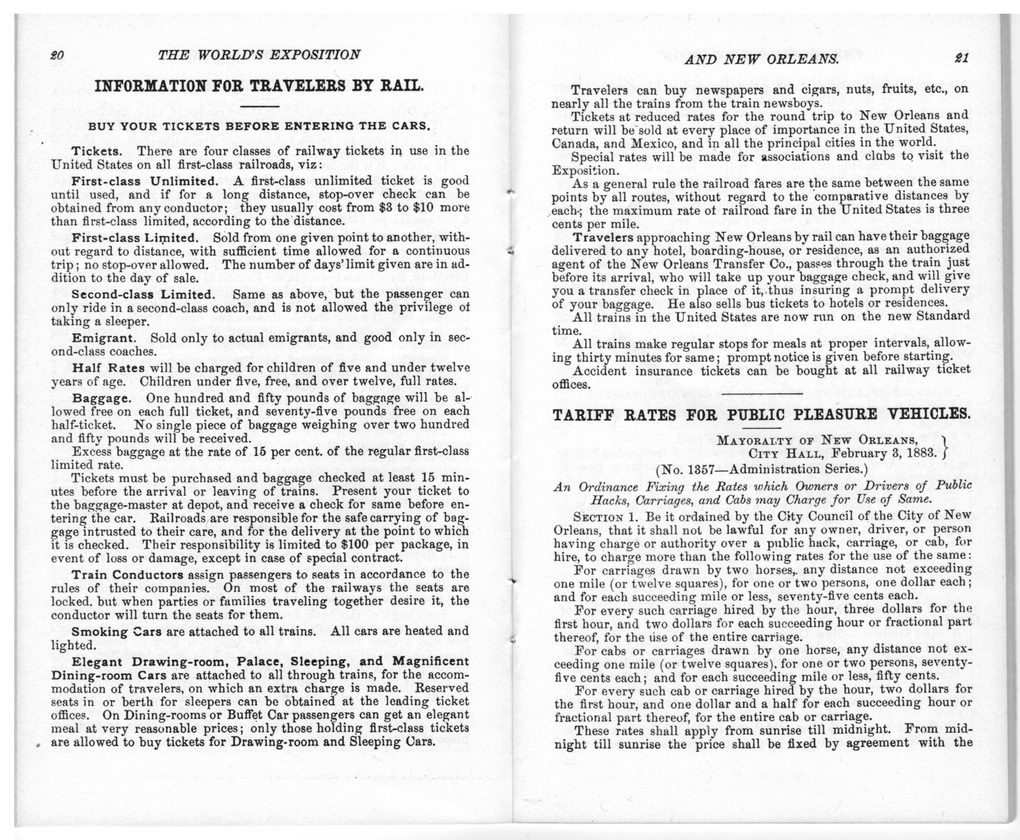This text was obtained via automated optical character recognition.
It has not been edited and may therefore contain several errors.
to THE WORLD’S EXPOSITION INFORMATION FOE TRAVELERS BY RAIL. BUY YOUR TICKETS BEFORE ENTERING THE CARS. Tickets. There are four classes of railway tickets in use in the United States on all first-class railroads, viz: First-class Unlimited. A first-class unlimited ticket is good until used, and if for a long distance, stop-over check can be obtained from any conductor; they usually cost from $3 to $10 more than first-class limited, according to the distance. First-class Limited. Sold from one given point to another, without regard to distance, with sufficient time allowed for a continuous trip; no stop-over allowed. The number of days’ limit given are in addition to the day of sale. Second-class Limited. Same as above, but the passenger can only ride in a second-class coach, and is not allowed the privilege ot taking a sleeper. Emigrant. Sold only to actual emigrants, and good only in second-class coaches. Half Rates will be charged for children of five and under twelve years of age. Children under five, free, and over twelve, full rates. Baggage. One hundred and fifty pounds of baggage will be allowed free on each full ticket, and seventy-five pounds free on each half-ticket. No single piece of baggage weighing over two hundred and fifty pounds will be received. Excess baggage at the rate of 16 per cent, of the regular first-class limited rate. Tickets must be purchased and baggage checked at least 15 minutes before the arrival or leaving of trains. Present your ticket to the baggage-master at depot, and receive a check for same before entering the car. Railroads are responsible for the safe carrying of baggage intrusted to their care, and for the delivery at the point to which it is checked. Their responsibility is limited to $100 per package, in event of loss or damage, except in case of special contract. Train Conductors assign passengers to seats in accordance to the rules of their companies. On most of the railways the seats are locked, but when parties or families traveling together desire it, the conductor will turn the seats for them. Smoking Cars are attached to all trains. All cars are heated and lighted. Elegant Drawing-room, Palace, Sleeping, and Magnificent Dining-room Cars are attached to all through trains, for the accommodation of travelers, on which an extra charge is made. Reserved seats in or berth for sleepers can be obtained at the leading ticket offices. On Dining-rooms or Buffet Car passengers can get an elegant meal at very reasonable prices; only those holding first-class tickets are allowed to buy tickets for Drawing-room and Sleeping Cars. AND NEW ORLEANS. SI Travelers can buy newspapers and cigars, nuts, fruits, etc., on nearly all the trains from the train newsboys. Tickets at reduced rates for the round trip to New Orleans and return will be sold at every place of importance in the United States, Canada, and Mexico, and in all the principal cities in the world. Special rates will be made for associations and clabs to visit the Exposition. As a general rule the railroad fares are the same between the same points by all routes, without regard to the comparative distances by each-; the maximum rate of railroad fare in the United States is three cents per mile. Travelers approaching New Orleans by rail can have their baggage delivered to any hotel, boarding-house, or residence, as an authorized agent of the New Orleans Transfer Co., passes through the train just before its arrival, who will take up your baggage check, and will give you a transfer check in place of it, thus insuring a prompt delivery of your baggage. He also sells bus tickets to hotels or residences. All trains in the United States are now run on the new Standard time. All trains make regular stops for meals at proper intervals, allowing thirty minutes for same; prompt notice is given before starting. Accident insurance tickets can be bought at all railway ticket offices. TARIFF RATES FOR PUBLIC PLEASURE VEHICLES. Mayoralty of New Orleans, 1 City Hall, February 3, 1883. J (No. 1357—Administration Series.) An Ordinance Fixing the Rates which Owners or Drivers of Public Hacks, Carriages, and Cabs may Charge for Use of Same. Section 1. Be it ordained by the City Council of the City of New Orleans, that it shall not be lawful for any owner, driver, or person having charge or authority over a public hack, carriage, or cab, for hire, to charge more than the following rates for the use of the same: For carriages drawn by two horses,, any distance not exceeding one mile (or twelve squares), for one or two persons, one dollar each; and for each succeeding mile or less, seventy-five cents each. For every such carriage hired by the hour, three dollars for the first hour, and two dollars for each succeeding hour or fractional part thereof, for the use of the entire carriage. For cabs or carriages drawn by one horse, any distance not exceeding one mile (or twelve squares), for one or two persons, seventy-five cents each; and for each succeeding mile or less, fifty cents. For every such cab or carriage hired by the hour, two dollars for the first hour, and one dollar and a half for each succeeding hour or fractional part thereof, for the entire cab or carriage. These rates shall apply from sunrise till midnight. From midnight till sunrise the price shall be fixed by agreement with the

New Orleans Centennial World Exposition 1884 Visitor Guide (12)